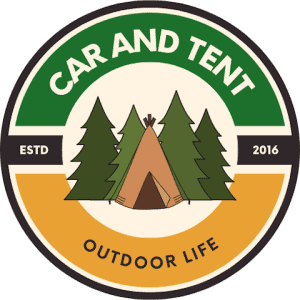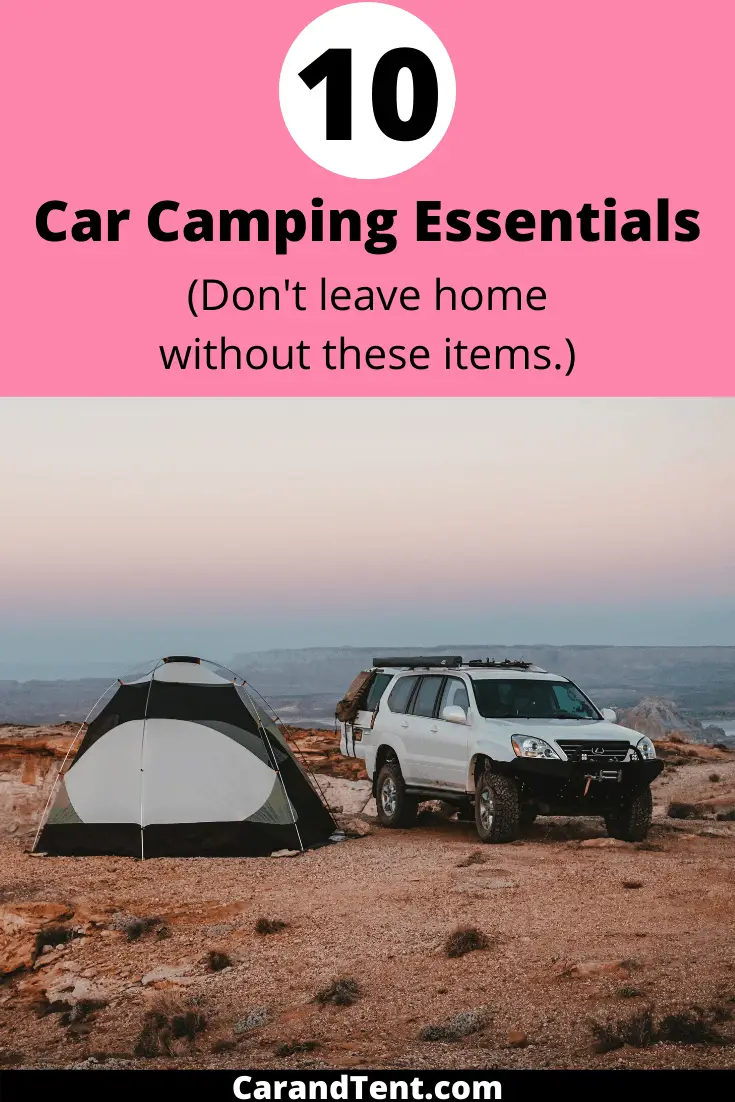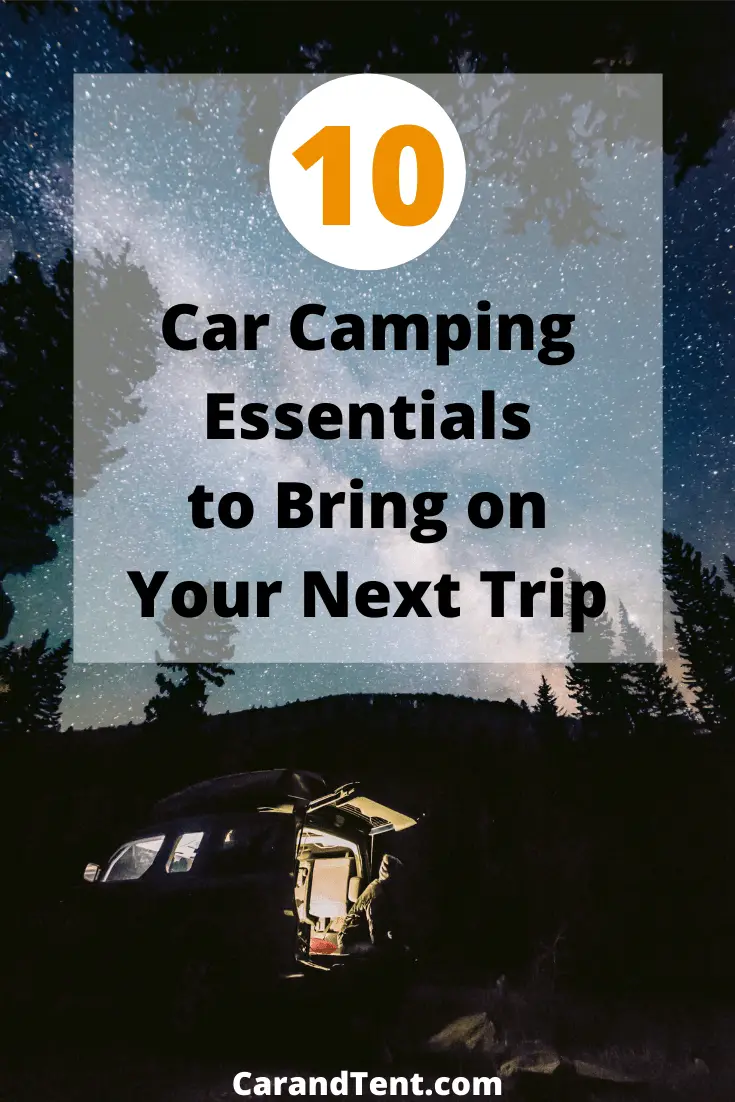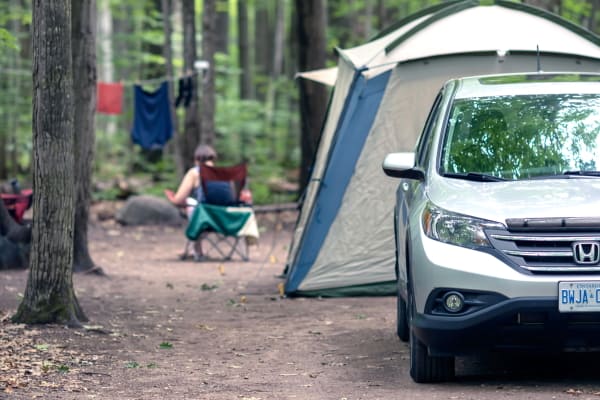
Car campers, unlike backpackers, have the option to take a lot of stuff with them. This is great because it can make us a lot more comfortable, but often-times, we end up taking a lot more than we actually need.
In this post, we’ll cover the car camping essentials so that you’ll know what you actually need and what you can leave behind on your next car camping trip.
Table of Contents
Must-Have Car Camping Gear
There’s a lot of gear that you can bring car camping, but here are the must-have items you need to bring.
1. Prescription Medicine
This is the one item on the list that you can’t find in the woods, borrow from someone else, or get locally. For this reason, any prescription medicine you take needs to be at the top of the list.
Before packing it away, make sure you check to see what the storage requirements are. You may find that your medicine needs to be kept within a certain temperature range. If this is the case, you may end up having to bring a cooler with you.
Even if there aren’t any storage requirements for your particular meds, you’ll probably want to pack your medicine somewhere where you won’t forget to take it. One tip you might want to use is to set a daily alarm on your phone as it can be easy to forget to take your medicine when you’re out of your normal element and off of your normal schedule.
2. Food and Water
Many campgrounds will have potable water that you can drink. However, this isn’t always the case. Also, sometimes the water can be inconvenient to get to and it often tastes bad.
Since you’re driving anyway, it’s usually best to drive your own water in. At the very least, pack a day or two of water just in case the local water source ends up being out of service.
You’ll also want to pack more food than you usually eat. This is especially true if you’re camping in cold weather as you’ll burn a lot more calories in the cold than you normally would.
Camping food doesn’t have to be elaborate either. If you’re just getting started, bring some pre-packaged dehydrated food for the weekend and you’ll be able to put off buying a camp stove and cooking supplies.
3. Kitchen Supplies
If you’ve decided to bring food that needs to be cooked, you’ll need cookware to cook it with and a camp stove to cook it on. Don’t just assume that you’ll be able to cook your food over the fire as campfires could be banned on the days you decide to go camping.
Even if you bring pre-packaged food, you’ll still want to bring a few kitchen supplies. You’ll need at least a cup and some utensils for eating. I’d also recommend you bring a knife or a pair of scissors to open up your food packages.
4. Shelter
Large tents are great for car camping and I’d recommend you get something big enough to stand up in. However, small tents can work just as well as large ones. In fact, if you’re camping somewhere with high winds, you might prefer a smaller and more aerodynamic tent. For more details on this, see my post on camping in high winds.
Some people like to take less traditional tents like hammock tents and tarp systems. Just keep in mind that your campsite might not have trees on it for you to use. In this case, you’ll want to bring something that you can use to set your tarp or hammock up with regardless of whether or not you have a tree available at your campsite.
5. Camp Tools
Setting up your shelter might require the use of a mallet or hammer to drive stakes into the ground, a shovel to fill sandbags up, and even a pickaxe to trench the outside of the tent in case of rain. You can bring all of these items separately or you can buy an entrenching tool that combines them all into one. This is what backpackers and soldiers use and they actually work quite well.
On top of this, you may need some camping tools for your vehicle as well. What I mean by this is that you might end up car camping in a spot that’s difficult to get in and out of. This is especially true on rainy, snowy, or icy days. To get around this, you might want to bring something that will help you gain traction.
Some people will pack kitty litter while others will buy traction devices to put under their tires. At the very least, you’ll want to bring an air compressor so that you can re-inflate your tires after deflating them to get more traction in sandy areas.
6. Emergency Supplies
I like to bring two emergency items with me when car camping. The first is a first-aid kit. You can buy these premade but it’s often better if you make one of your own.
The reason for this is that you won’t pack anything that you know you won’t be able to use. For instance, it’s great that some first aid kits come with suture kits in them but that kit would be useless to someone like me that doesn’t know how to suture.
On top of my DIY first aid kit, I also like to bring a fire extinguisher with me. This gives me some extra protection in case my fire or someone else’s fire starts to get out of hand.
7. Lighting
Without all of the noise pollution, it can get much darker than we’re used to. At the very least, you’ll want to bring a couple of flashlights with you to get around at night.
Personally, I’ll go all-in with a flashlight, a headlamp, and a lantern. The headlamp makes it easy to set up and take down the campsite in the dark while the flashlight provides an easy way to directly focus light on anything I need to see. The lanterns are nice for lighting up the inside and outside of my tent at night and their good for late-night bathroom breaks.
8. A Personal Hygiene Kit
Just because you’re out in the wilderness, doesn’t mean you have to live like a wild animal. Bring soap, shampoo, toothpaste, and any other personal hygiene items you would normally use.
Also, add in some toilet paper and some baby wipes as well. Sometimes campground bathrooms consist of only pit toilets and they often do not have toilet paper inside of them.
9. Bug Repellent
Bugs and insects are a much bigger threat to your well-being than anything else you might come across when camping. A simple day hike in a remote area can leave you covered in ticks and mosquito bites. Lime disease and West Nile Virus can be cured if caught early but as we all know an ounce of prevention is worth a pound of cure.
Consider using a spray that contains DEET. A lot of research has been done on this chemical and it’s been proven to be both safe and effective. If you’ll be camping in an area with a particularly high instance of bugs and insects, you may want to consider treating your clothing with permethrin as well. This substance will kill bugs that get on you but it may also be harmful to the environment so only use it when necessary.
10. Sun Screen
You’re much more likely to die from skin cancer than you are to die from getting attacked by a bear, snake, or mountain lion while out in the woods. Bring sunscreen and reapply often. This is especially true if you’ll be swimming. Remember, most sunscreens won’t last more than 2 hours when swimming so you may have to reapply multiple times throughout the day.
Some people will buy sunscreens with bug spray in them. Personally, I’ve never tried these sprays but I’ve heard from people who have and they feel that they work well.
Nice-to-Have Car Camping Gear
Just because an item isn’t essential, it doesn’t mean that it isn’t a good idea to bring it. Here are a few of the items that I never go camping without.
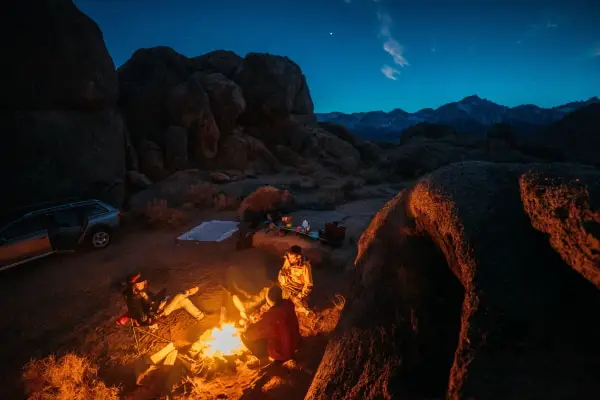
Camp Chairs
A folding camp chair makes nights by the campfire a lot more comfortable. This is especially true when the ground is cold or wet.
Folding camp chairs don’t take up much space and they make the camping experience a lot more fun. For some added luxury, get one with a cup holder and an optional overhead cover. On sunny days, you can put the cover over you when you bring the camp chair down to the lake or any other open area.
Comfortable Sleep Aids
You don’t need to bring your entire bedroom set but it’s nice to have a cot to sleep on. If you don’t have a cot or you don’t have enough room to pack a cot, consider bringing a good pad for the ground that you can roll up to save on space.
Also, don’t feel restricted to a sleeping bag. When you’re car camping, you can trade out your sleeping bag for a nice blanket and pillow instead. You’ll be more comfortable this way as you won’t be restricted by the confines of a sleeping bag.
Head Phones/Ear Plugs
When I think about my camping trips I usually remember the sounds of the birds and the rivers that I camped beside. Unfortunately, this isn’t always the reality of car camping.
Sometimes, you’ll be stuck next to a rowdy group of campers that have decided to stay up all night drinking and playing loud music. This is especially true when in private campgrounds without rangers. Other times, you’ll want to sleep in but instead, you’ll awaken to the sound of a generator coming on in the campsite next to you.
For these reasons, I suggest you bring a good pair of headphones so that you can drown these sounds out while you’re awake. When you decide to go to sleep for the night, you can switch the headphones out for a nice set of earplugs instead.
A Good Cooler
I don’t always bring food that needs to be cooked. However, even without cold food, I still like to bring a good cooler so that I can have cold drinks throughout my trip.
At the end of a long hike or paddle, there really isn’t anything better than enjoying a nice cold drink back at the campsite.
